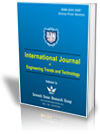Effect of Stiffening Ribs on the Dynamic and Static Stiffness of a Computerized Numerically Controlled Machine Tool Column
Citation
Arun Kumar Arya, Dhananjay Gupta"Effect of Stiffening Ribs on the Dynamic and Static Stiffness of a Computerized Numerically Controlled Machine Tool Column", International Journal of Engineering Trends and Technology (IJETT), V30(5),228-234 December 2015. ISSN:2231-5381. www.ijettjournal.org. published by seventh sense research group
Abstract
Column stiffness affects the dimensional accuracy of the
work-pieces machined on a CNC machine tool. The static
stiffness is characterized by column displacement whereas
the dynamic stiffness is a function of the natural frequency
of the column. A computational procedure based on
ANSYS, a finite element package, for the static and dynamic
analysis of a CNC machine tool column was applied [1, 2].
Derived parameter method [1] developed by the authors
was used for mathematical modelling.
Practically, for a column of high stiffness, the displacement
should be as low as possible and the natural frequency
should be far away from the operating speed zone of the
machine tool. Besides, for a given displacement d, the
material volume requirement, v for an optimal column must
be minimum. Put together, the product P of displacement d
and material volume v must be minimized in order to
optimize a column. Hence, the minimum values of Product,
P (d*v) as well as displacement, d have been used as the
optimization criteria for column design. For dynamic
stiffness, it is aimed to achieve the highest possible natural
frequency.
The impact of the number and cross-sectional area of
horizontal as well as vertical stiffening ribs on column
displacement and its natural frequency was studied. The
results obtained and the conclusions derived have been
reported in the paper.
References
[1] Manu Gupta and P. D. Murarka, “Optimization criteria for
the design of a computerized numerically controlled machine
column using finite element method”, International Journal
of Mechanical Engineering, Vol. 41, Issue 2, pp. 1180-1184,
September, 2013.
[2] Arun Kumar Arya, Manu Gupta and Dhananjay Gupta,
“Dynamic Analysis of a Computerized Numerically
Controlled Machine Tool Column”, International Journal of
Mechanical Engineering, Vol. 42, Issue 2, pp. 1263-1268,
December, 2014.
[3] Dezhong Kong, JingfengShen&Baohui Li; “Finite-element
Analysis and Optimization for the Column of Numerically
Controlled Triaxial Deep Hole Drilling Machine”,
Mechanical Engineering Research; Vol. 2, No. 1; 2012.
[4] Yuhong Zhang, Wenhua Ye, Sheng Leng&Wenyong Shan;
“Bionic Design for Column of Gantry Machining Center
Using Honeycomb Structures”, Proceedings of the World
Congress on Engineering 2012,Vol III, WCE 2012, July 4 -
6, 2012, London, U.K.
[5] L. Zhao, W.Y. Chen & J.F. Ma, “Lightweight Design of
High-speed Working Table Based on Structural Bionic”,
Modular Machine Tool & Automatic Manufacturing
Technique,no.1,pp.1-4, 2008.
[6] Wedad I. Alazzawy, “Static and Dynamic Analysis of
Stiffened Plate Used in Machine Tool Column”, Journal of
Engineering, Vol. 14, No 4, December 2008.
[7] Hedi Yangui et al, “Influence of Cutting and Geometrical
Parameters on the Cutting Force in Milling”, Engineering,
Scientific Research, 2010, 2, 751-761.
[8] Joshi, A.M. et al, “Finite Element Analysis of CNC Lathe
Headstock”, Journal of Information, Knowledge and
Research in Mechanical Engineering, Vol. 2, No. 1, Page
135, Oct. 2012.
[9] Edmund Isakov, “Understanding tangential cutting force
when milling”, Cutting Tool Engineering Plus, May 2012 /
Volume 64 / Issue 5.
[10] Georgi STOYCHEV, “FE Analysis of Gray Cast Iron
Structural Elements”, Machine Design, May 10, 2010.
[11] Release 11.0 Documentation for ANSYS, www.ansys.com
Keywords
Displacement, finite element, column,
stiffness, ribs.



